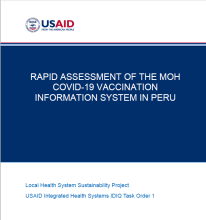Learning and knowledge sharing are fundamental to the LHSS Project. We invite you to search LHSS knowledge products and resources for the latest approaches, insights, and learning in the field of integrated health systems strengthening.
This document outlines recommendations for the design and implementation of the National Migrant Health Observatory. The recommendations seek to facilitate greater coordination and exchange of information among the public, international cooperation and civil society actors or stakeholders that articulate the response to Venezuelan migration in the country.
This document presents the Plan for the development of Organizational Capacities of the DPVIH of the Ministry of Health of Peru to improve the provision of health services against HIV to the Venezuelan migrant population in Peru
Proper specimen collection and transport play an important role in the accurate and timely identification of newly emerging infectious diseases. This report provides recommendations for improving the specimen collection and transport system in Peru.
LHSS has conducted a review of the information systems of countries along the migration route, as well as the mandates and roles of subregional platforms and supranational agencies related to the cross-border exchange of health information.
This is the first study to assess, with validated methodology and questionnaires, the perception that patients and health professionals have about the ease of use, usefulness, and general satisfaction of an application for the registration of healthcare information created by MINSA.
For countries wanting to strengthen health budget execution, learning about promising approaches used by others is one thing but putting them into practice is another. This blog reveals how two countries, Lao PDR and Peru, adapted promising practices and began to implement them.
Este informe presenta los hallazgos de una revisión documental del marco normativo y acuerdos internacionales para el intercambio de información transfronteriza de la información de tratamiento de VIH en población migrante con VIH, así como de entrevistas con los programas de VIH de los países y con organismos supranacionales, cooperantes y otros.

La Estrategia de Comunicación para el Cambio de Comportamiento frente al COVID-19 (ECCC COVID-19) es un esfuerzo intergubernamental de los gobiernos regionales de Arequipa, Madre de Dios, Moquegua, Puno y Tacna, a iniciativa de sus autoridades sanitarias regionales, para fortalecer su estrategia de salud pública y lograr sus objetivos sanitarios frente a la pandemia por SARS-CoV-2.

This resource provides recommendations aimed at strengthening the Ministry of Health’s functional capabilities and operational capacities to generate and use information for effective deployment of COVID-19 vaccinations.

This resource provides recommendations aimed at strengthening the Ministry of Health’s functional capabilities and operational capacities to generate and use information for effective deployment of COVID-19 vaccinations.
This report is a health system assessment focused on HIV care services for Venezuelan migrants living in Peru. The assessment reviews secondary data sources; interviews with key informants, users, and professionals who are responsible for health facilities providing Antiretroviral Therapy (HF ART); observes visits to selected HF ART; and provides an overview of a self-administered survey to those responsible for HF ART in the country.
En este informe, LHSS evalúa la demanda de productos básicos para el VIH necesarios para brindar una cobertura adecuada a los venezolanos que viven con el VIH en Perú y analiza los sistemas de pronóstico existentes en el Ministerio de Salud para determinar su precisión en la adquisición y el seguimiento de la distribución de medicamentos clave para el VIH.
In this report, LHSS quantifies the demand for HIV commodities needed to provide adequate coverage for Venezuelans living with HIV in Peru and analyzes existing forecasting systems at the MOH to determine its accuracy in procuring and monitoring the distribution of key HIV drugs.
LHSS tiene como objetivo fortalecer la capacidad del Ministerio de Salud para garantizar la disponibilidad de productos para el VIH (ARV y dispositivos médicos) para la población migrante venezolana en Perú. Como parte de este esfuerzo, LHSS estimó la demanda de productos relacionados con el VIH relacionados con esta población, incluidos detalles como el tipo, la cantidad y el momento.
This report provides a summary of the results of the quantification of demand for HIV commodities for the Venezuelan migrant population in Peru. It includes the capabilities and limitations of the quantification model, its approach to quantification, and the sources used.
